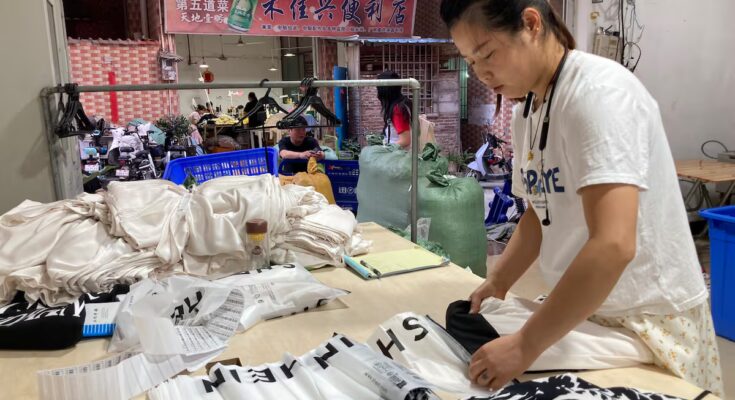Shein, the Chinese ultra-fast fashion giant, is in the eye of the European storm. The platform that revolutionized textile consumption with ridiculous prices and an unprecedented production speed is now faced with a regulatory front that does not give up: the European Union is investigating it for deceptive commercial practices, France has temporarily suspended access to its site after the scandal over the sale of sex dolls that resemble girls, Italy fined it one million euros in August for having falsified the impact that its products have on the environment (a strategy known as greenwashing) and distributors from several countries, including the Spanish Retail Association (ARTE), are calling for a level playing field. The model that led it to conquer the closet of European generation Z now clashes with the wall of norms and values with which Brussels seeks to protect its digital economy.
Shein does not design clothes, but consumer models. The key to its business is data: Its powerful algorithm can predict trends in dozens of markets in real time based on user behavior, allowing it to adjust inventory supply based on demand in seconds. This mechanism, which combines artificial intelligence, flexible suppliers and very low prices, has made competition rules dynamic throughout the world.
In 2024, the company, which does not sell products in China and concentrates its sales abroad, recorded revenues of 37 billion dollars (about 32 billion euros), according to the latest data published by its parent company, Roadget Business, cited by Reuters. By 2025, the company expects a net profit of $2,000 million (€1,734 million), according to sources cited by Bloomberg, which suggests that its profits could almost double from last year’s $1,100 million. In comparison, rival Inditex had a turnover of 38.6 billion euros and achieved a net profit of 5.9 billion, while the turnover of the H&M group was 22 billion, with a profit of 1 billion.
Shein’s monthly users in the EU grew to 146 million as of mid-this year, 16% higher than mid-last year. Low-cost exports from Shein and other giants like Temu or Alibaba continue on an upward trajectory. So far this year they amount to $20.5 billion (about 17.8 billion euros) and almost five times the figures for 2020, according to Reuters.
Founded in 2008 in the Chinese city of Nanjing, it changed headquarters to Singapore in 2022, with the idea of accelerating its international expansion. Its business model takes the idea of ultra-fast manufacturing to the extreme. To do this, it uses a network of small textile workshops with which it negotiates lower prices in exchange for loyalty and order volume.
The Panyu district in the Chinese city of Guangzhou, capital of Guangzhou province, is one of its manufacturing epicenters, with more than 7,200 companies dedicated to clothing and another 27,000 selling clothing, according to official data. Many are concentrated in Nancun, an area known as “Shein town” due to the number of companies that supply the Chinese giant, and other similar platforms, such as Temu.
The city of Shein is a maze of busy streets. There are numerous workshops at street level. Even four or five story buildings are full of them. The walls are lined with advertisements from textile companies looking for employees, with details on salaries and fabric orders. They ride transport motorcycles carrying loose fabric curlers. Bags of clothes go from place to place. In the workshops, employees sew, fold and iron the finished garments. Shein logos, bags and packages are often seen in the area.
The owner of one such shop, Luo Weijun, a migrant from Jiangxi province, said last spring that he was satisfied with the Shein model. It seemed to him “more human” than that of others such as Temu or Amazon, he told EL PAÍS during a visit to Panyu, while preparing branded clothes. According to his testimony, Shein usually avoids competition between peers, entrusting the creation of each model to a laboratory. Other entrepreneurs, however, have shown more reservations, since the profit margins resulting from the collaboration with Shein are very small.
In the area people work long hours for very low wages. “Illegal working hours and piece wages continue to be a common feature in the daily lives of the workers interviewed,” an investigation by the Swiss organization Public Eye said in 2024.
In February, under questioning by British MPs, Shein acknowledged two cases of child labor among its suppliers, although it said it had stopped them immediately. The company was facing questions from lawmakers as it was considering listing in London for 50 billion pounds (about 56,900 euros), a deal that didn’t work out. Now, according to Bloomberg, the company is considering moving its headquarters from Singapore to China to set the stage for a possible IPO in Hong Kong.
Its business model is also based on the ability to exploit tax and customs loopholes. These holes have put it at odds with the United States and the European Union. The so-called exemption de minimis It was one of the obsessions of US President Donald Trump in his tariff barrage. In May, the Republican canceled this exception that allowed the entry of low-value packages (less than $800, about 685 euros) without taxes or customs checks, which greatly benefited China, the main sender of these shipments.
The European Union has a similar clause for parcels under 150 euros, which Brussels plans to eliminate in March 2028 under the current customs reform plan. Some lobby groups, hit by the rising tide of cheap Chinese exports, have called on the European Commission to speed up its plans.
The community executive has also increased surveillance around Shein in recent months. Under the Digital Services Act (DSA), passed in 2022 and in full effect from 2024, the EU requires large platforms in the digital universe to comply with additional vetting requirements so that what is offered on their platforms complies with the law. In the case of product sales giants, they are required to ensure, for example, that they do not sell weapons that cannot be sold or dolls that incite pedophilia.
Brussels has since tightened the siege. In June 2024, it asked the company to provide more information on the measures it takes to comply with the DSA on issues such as the transparency of its recommendation system or the protection of minors. In February it returned to the office, requesting internal documents and more detailed information on issues such as the risks associated with the presence of illegal products and consumer protection. The procedure could lead to the opening of a case file and the imposition of millions of fines.
Furthermore, the Commission is coordinating an investigation into possible Shein practices at European level, together with national consumer protection authorities. These include false discounts, pressure sales with false purchase deadlines, and incomplete, incorrect, and misleading information. In May, Brussels notified the company that it had found practices that breach EU law and requested more information. The investigation is ongoing.
The Chinese government, for the moment, is avoiding the issue. In response to a press question about Shein’s suspension in France, Mao Ning, spokesperson for China’s Foreign Ministry, referred to the “relevant authorities” on Thursday. He added that the Chinese government requires companies to operate in accordance with laws and regulations and fulfill their corporate responsibilities. “We also hope that stakeholders will respect the principles of the market economy and provide a fair, transparent and non-discriminatory business environment for companies from all countries,” he concluded during a routine appearance.



